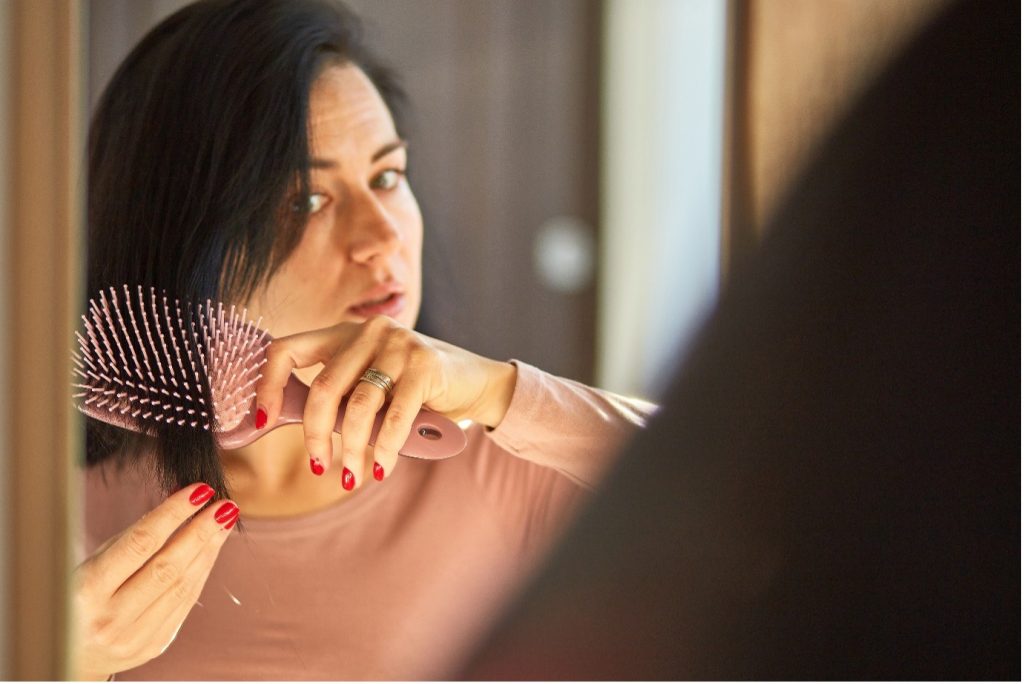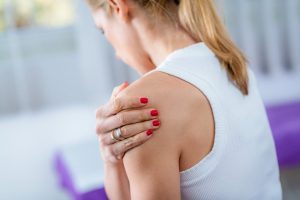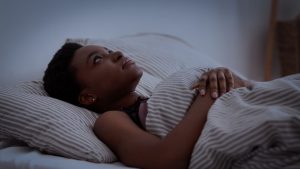By: Guest Author
Published: March 11, 2022
Written By Krishma Patel- Guest Contributor
Hair loss during menopause is one symptom amongst many other menopausal symptoms like mood swings, sleep disruption, and hot flashes. Menopause and weight gain are also notoriously connected. The good news is there are many effective treatments and preventive measures to save your precious hair from postmenopausal hair loss.
HRT medication, Minoxidil, stress reduction, exercising, and vitamins are highly effective treatments for hair loss during menopause. Read on to know more about why menopause causes hair loss, its symptoms, preventive measures, and menopausal hair loss treatment.
Link Between Menopause and Hair Loss
Your hormonal balance goes haywire during your premenopausal and postmenopausal stages of life. The estrogen and progesterone hormones are responsible for making hair long and strong. But they significantly decline due to menopause. Low estrogen cause hair loss and many other health problems such as UTIs and depression.
And because these hormones don’t grow up to optimal levels, the production of androgen increases. Androgen is known to shrink hair follicles leading to hair thinning due to menopause.
Symptoms of Menopause Hair Loss
Menopause hair loss is different from usual hair loss. More than hair loss, menopause induces hair thinning. It means you will experience subtle hair loss after menopause which might not be noticeable at first.
These are some most common symptoms which you experience during perimenopause thinning hair:
· Breakage in hair.
· Visible scalp near the hairline.
· Lots of hair in the shower drain, pillow, and hairbrush.
· Widening of hair parting.
· Significant hair thinning at the side and crown of the head.
· Limped hair, not suitable for styling.
· Not enough density in a ponytail.
Menopausal Hair Loss Treatment & Prevention
You can minimize the effects of postmenopausal hair loss by getting reliable medical treatments and adopting lifestyle changes as mentioned below:
Hormone Replacement Therapy (HRT)
Although HRT provides excellent hair regrowth, it’s also effective in treating other issues related to hormonal imbalance in your body. Estrogen and progesterone are the primary medications used in HRT treatment. You get extraordinary results when bio-identical hormone pellets are used in HRT treatment for menopause.
Some of the best hrt medications for hair loss are Estradot, Elleste Solo MX, Elleste Duet Conti, and Livial. Remember, HRT medicines should be taken under the supervision of your trusted OB-GYN only.
Minoxidil
Minoxidil works as a vasodilator, which means it widens the blood vessels. Due to wide vessels, blood flow to the scalp increases. The hair follicles also increase in turn. This drug is available over-the-counter. It is known by its brand name, i.e., Rogaine.
Minoxidil works for post & perimenopause hair loss, male pattern hair loss, and female pattern hair loss. It comes in multiple forms, such as liquid solution, spray, and foam.
Avoid Stress
Mental stress is a major culprit when it comes to hair changes during menopause. New hair growth happens with the cycle of hair follicles. Continuous anxiety and hair loss are related, thereby causing patches and baldness. Extreme stress puts more follicles into resting mode, which hampers hair growth and triggers hair loss.
Your hair follicles take a while to come to a regular cycle after your stressful phase is over. Therefore try to avoid stressful situations, do meditation & deep breathing, and adapt a hobby to lead a stress-free lifestyle.
Stay Away From Chemicals
Avoid putting chemicals in your hair if you have symptoms of menopause hair loss. Your hair extensions, perming, curling, straightening, and other hair styling urge need to wait until you come out of your hair loss phase. This is because the chemical used in all these processes are harmful to your scalp and roots of hairs.
Wash your hair with a shampoo and conditioner low in chemicals and based on natural products. Chlorine in swimming pools is also injurious to hairs. So always swim wearing a shower cap.
Eat Healthy & Exercise
Adopting a healthy lifestyle is essential in every stage of life. It becomes more vital during menopause. Nutritious food and regular exercise help prevent thinning hair during menopause. It maintains hormonal balance and reduces other symptoms of menopause, such as insomnia and mood swings.
Being active and doing regular exercise also breaks the link between menopause and weight gain. You would want to add healthy eating to your routine once you see the results of daily exercising.
Eat Vitamins & Mineral Supplements
You may not get all the goodness from your regular food, which you need to grow healthy hair. Therefore supplements of minerals and vitamins for hair loss during menopause are beneficial. The right kind of medication can increase your hair count while controlling the falling and breaking of hair.
Effective supplements address both post and perimenopause hair loss. Experts believe in components such as flaxseed, omega-3 fatty acids, maca, plant sterols, and herbs like basil and ashwagandha as supplements for healthy hair.
Wrapping Up!
It’s natural to feel anxiety and insecurity with the beginning of menopause hair loss. But if you do the right kind of lifestyle changes and go for effective menopausal hair loss treatments, you can keep the shedding of hairs to a minimum. The changes can be slow initially, but consistent improvement will give you the desired outcome over time.
Author Bio: Krishma Patel is the Co-founder and the Superintendent Pharmacist at MedsNow, an online pharmacy in the UK that provides health and wellness products and treatments along with free online consultations. She is passionate about showcasing the integral function community pharmacies can play in supporting the healthcare system and the NHS by providing patients with high quality, safe and discreet access to healthcare at their convenience. Along with being the co-founder of MedsNow, Krishma is also the Director and the Superintendent Pharmacist of Enimed Ltd., an independent pharmacy group comprising 32 branches.
The views expressed herein this article, written by a guest contributor, do not necessarily represent those of the Red Hot Mamas organization. The content is for informational purposes and should not substitute the advice of your doctor.









